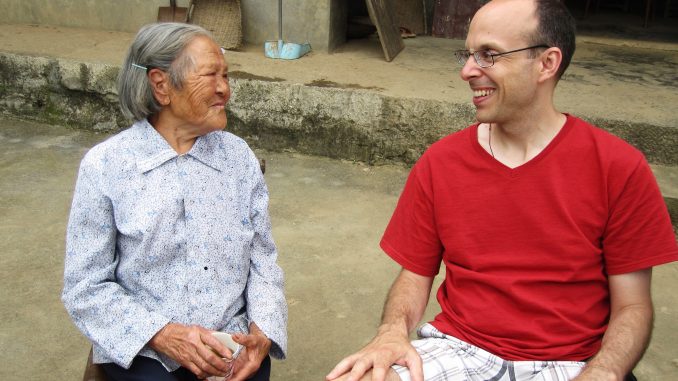
The chapel, located in rural China, was derelict. Its pews were flimsy, its artwork was fading and discolored and its paint was peeling.
Amid all of these signs of neglect, John Smagula saw a glimmer of hope. A small candle lit in the chapel inspired him.
“The faith was still alive in that village, even though the chapel was falling apart,” Smagula said.
Smagula, an associate professor at Temple’s Beasley School of Law and the director of Asian Programs for the law school, started a tea company, Crossings Tea, to assist impoverished Catholic farmers located in the Three Gorges Dam region of China, an area negatively affected both economically and environmentally, by the building of the massive dam. In addition to aiding the farmers economically, the company aims to help financially support the Catholic Church in the area.
Smagula’s route to becoming the founder of Crossings Tea is circuitous, he said. Before coming to Temple, he worked as a corporate lawyer on Wall Street, making money and establishing his career.
“Wall Street was a proving ground for me,” said Smagula, who has been teaching at Temple since 2003. “I saw how the world works from that angle.”
However, Smagula was not satisfied with his career path. He wanted to make an impact on the world.
“There was emptiness to [working on Wall Street],” he said. “I wanted to do more.”
He officially began exporting Chinese tea to the U.S. last year, after founding Crossings Tea in 2010.
Crossings Tea is still in the gaining-awareness phase, Smagula said. He is attempting to bring attention in the U.S. to his company in China.
“You get a spectacular flavor and a spiritual lift,” he said.
Smagula’s fascination with China began in high school after talking about the country with one of his teachers. He was captivated by Chinese culture and language and studied it in college. In 1991, he visited the country for the first time.
“It was a transformative experience,” Smagula said. “It changed my whole view on life and opened my eyes to a world greater than anything I imagined.”
Coffee, Smagula’s drink of choice at the time, was not widely available during his early trips to China, so he became an avid consumer of tea. He began tasting the different flavors as he traveled across the country. What began as a hobby turned into a commercial business.
“[Tea] became a passion for undervalued tea, its small, impoverished Catholic population and its beautiful landscape, he said.
“I wanted to go to an area where I could make a difference,” Smagula said.
In January, Smagula visited Temple’s Newman Center, which serves as the Catholic Church on Main Campus. While there, he hosted a talk about the church in China and distributed a few boxes of his tea.
Father Shaun Mahoney, the director of the Newman Center, said he felt Smagula’s dedication to his message.
“He seemed like he was passionate about the mission and really inspirational,” Mahoney said. “Just as he sort of has awakened to a mission, I think he was contagious in that regard, really encouraging our students and young people to be attentive to the mission that they’re being called to.”
It is hard to separate Smagula’s tea company from his faith, he said. In fact, Smagula does not refer to Crossings Tea as a business, but as a “mission.” The business, in his mind, is just a “vehicle” for his mission.
“Faith drives me, personally,” Smagula said.
As a Catholic, Smagula does not feel like he is in a foreign country when he is working with the tea farmers and the clergy, adding that he is like “ a member of the same family.” Despite his sentiments, Smagula said the Chinese Communist Party has not always acted favorably toward religion and foreign businesses. However, together with the local clergy, Smagula was able to demonstrate the value of Crossings Tea.
“Rather than focus on what I can’t do, I work with what I can do,” he said. “The purpose is to show that a church can be a positive force in civil society.”
Smagula said he uses his legal background to work within Chinese regulations, working with the church and the government to form his company in a “very transparent” way, he said.
Smagula’s journey from Wall Street to academia and now into the realm of a small Chinese tea company, has been about “a quest for self-fulfillment,” he said. Perhaps Crossings Tea is the answer to his prayers.
Jack Tomczuk can be reached at jack.tomczuk@temple.edu.



Be the first to comment